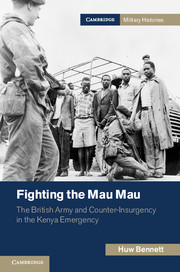Book contents
- Frontmatter
- Contents
- Maps
- Abbreviations
- Acknowledgements
- Introduction
- 1 ‘A determined campaign against the terrorist bands’
- 2 ‘Harmonious relations’: soldiers, civilians and committees
- 3 ‘Possibly restrictive to the operations’: marginalising international law in colonial rebellions
- 4 ‘The degree of force necessary’: British traditions in countering colonial rebellions
- 5 ‘Restraint backed by good discipline’
- 6 ‘A dead man cannot talk’: the need for restraint
- 7 ‘A lot of indiscriminate shooting’: military repression before Erskine's arrival
- 8 ‘Severe repressive measures’: the army under Erskine
- 9 ‘An essential part of the campaign’: civil-military alliances
- Conclusion
- Bibliography
- Index
Conclusion
Published online by Cambridge University Press: 05 December 2012
- Frontmatter
- Contents
- Maps
- Abbreviations
- Acknowledgements
- Introduction
- 1 ‘A determined campaign against the terrorist bands’
- 2 ‘Harmonious relations’: soldiers, civilians and committees
- 3 ‘Possibly restrictive to the operations’: marginalising international law in colonial rebellions
- 4 ‘The degree of force necessary’: British traditions in countering colonial rebellions
- 5 ‘Restraint backed by good discipline’
- 6 ‘A dead man cannot talk’: the need for restraint
- 7 ‘A lot of indiscriminate shooting’: military repression before Erskine's arrival
- 8 ‘Severe repressive measures’: the army under Erskine
- 9 ‘An essential part of the campaign’: civil-military alliances
- Conclusion
- Bibliography
- Index
Summary
Whilst I may have to take stern measures to restore respect for the law nobody need doubt that I believe in justice. I desire to see this country returned to a normal process of Government where justice and progress for all races and creeds can be developed in an atmosphere of peace.
British soldiers in Kenya understood the Mau Mau uprising as deriving, to a certain extent, from injustices within the colony. The inequalities were obvious to any soldier who saw how many settlers treated their labourers. Some young men asked to kill strangers in an exotic country aimed wide of those they were supposed to shoot. Other soldiers physically stopped local security forces from committing murder and torture. When thinking about the British Army's behaviour in the Kenya Emergency, we must remember that a large proportion of soldiers conducted themselves honourably. In this sense, the orthodox understanding of British counter-insurgency has a point. Clear elements of restraint were present in military policy from 1952 to 1956. These were thoroughly dependent upon the army's ability to field a disciplined force against the Mau Mau. Without this discipline, commanders could not have used violence in an instrumental fashion to defeat the insurgency. Repeated efforts were made by GHQ to instil and maintain a disciplined fighting force.
Restraint was evident in military policies such as legal zoning, the surrender schemes, the humane handling of prisoners and the pseudo-gang operations. The influence of the minimum force concept can certainly be traced in actual practice on operations. Clear rules prevented the conflict from degenerating into genocide. Aside from constituting formal policy, there is evidence that ordinary soldiers appreciated that restraint and humanity would help win the campaign. Hundreds of Mau Mau surrendered in the knowledge that they would not instantly be put to death. Prisoners in military hands could often expect to receive humane treatment. After incrementally piecing together a sophisticated intelligence appreciation of the insurgency special forces were able to target militant gangs so as to minimise the suffering of ordinary people. As General Erskine declared the day after arriving in Kenya, he believed in justice.
- Type
- Chapter
- Information
- Fighting the Mau MauThe British Army and Counter-Insurgency in the Kenya Emergency, pp. 264 - 269Publisher: Cambridge University PressPrint publication year: 2012



